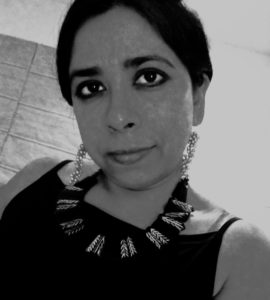BIO
NABINA DAS is a poet and writer based in Hyderabad. Her poetry collections are BLUE VESSEL and INTO THE MIGRANT CITY. She has authored a novel titled FOOTPRINTS IN THE BAJRA and her short fiction volume is THE HOUSE OF TWINING ROSES: Stories of the Mapped and the Unmapped. A 2012 Charles Wallace creative writing fellowship, 2012 Sangam House fiction fellowship, and 2007 Wesleyan Writers Conference fellowship alumna among others, she has also been a 2016 Commonwealth Writers feature correspondent, and currently holds a 2017 Sahapedia-UNESCO fellowship. Published and anthologized widely, Nabina has co-edited 40 UNDER 40: AN ANTHOLOGY OF POST-GLOBALISATION POETRY (2016), and teaches creative writing in universities and independent workshops. Trained in Indian classical music and a former street theater performer, her other interests are cinema and traveling. Nabina’s forthcoming collection is Sanskarnama: Poetry for our Times.
.
Melancholy of the Soul
It’s the story of a sea. Passion is its surge.
Note the rise. Crest follows crest, so tender.
It’s a tale of our fingers, sexed from paan stains.
Holding on to love’s truth. Morsels of kisses.
It’s a painter’s summer dream:
lusty, light-levered, pale gone to rage,
high wind bringing together words fish boats
— all that the shores will store, and life.
Could it be a heart splayed around its beats
half-rhymed. See, it stops and again sprays scarlet.
Such a story must also have the color red,
red for magic and melancholia, a half-prodded rose.
A bus on Mohammad Ali Road, all asleep
inside its dusty innards. Dreams floating
like oil after the treachery of the rains.
It’s a boy with two parakeets — one
perched on his fist, the other inside his head.
Both flaming to the point of turning green
with the sourness of our derelict times.
Then love bites on shoulders like yesterday’s moon,
verses for a city that speaks. And we listen to its veins.
Once in the ‘ruh’, it deepens. The sea,
rocks, forest. Then darkens love and pain.
Only Mumba’s words light up: you call it ‘huzn’.
For us, humans in folly like gods in vain.
…
When Everyone Asked for a Name
Dedicated to 16-year-old Junaid and the “not in my name” protests that flared up following his murder
Just a regular frangipanied summer day at the railway station
a little in between the hours of waking and sleep
the puffed-rice clouds in the sky were regular in shape
a light breeze, said to be of summer’s grace, was at play
such romance of the train is a never-ending story
but the romance of blood is irregular when seen on a face —
and the men ask: is your name Junaid?
Inna lillahi wa inna ilayhi raji’un
I’m looking at the languid suburban rail coach in the news
with the killers’ eyes, with the nose of a troublemaker
I’m smoking the same cheap cigarette they puffed
and I’m drunk with the same impunity of the burly men
it’s a moment when human sweat smell takes over the track stink —
and the mother asks: where is Junaid?
Inna lillahi wa inna ilayhi raji’un
It’s a panorama like everyday sun’s rise or set chugging by
one that pans across faces, forms, a skull cap soiled
one that tugs and slaps at lightly dotted teenage chins
a canvas of invisible boys women elders that the station hosts —
and how no one asks: is this Junaid?
Inna lillahi wa inna ilayhi raji’un
the shape of things was clouds, broken Cola bottles
smashed clay tea cups thrown from moving windows
a blood-stained seat corner feeling the rush of summer breeze
and then a Maru Bihag coiling up with the shape of wails —
did someone ask: are you Junaid?
Inna lillahi wa inna ilayhi raji’un
the sound of iron wheels and mint smell mixing with air
spice and spit touching the moss of ancient stones
then salt on the tongue, sweat on molar teeth seeping slow slow
right inside the heart. Then all stops. Just a cracking crush.
And all of us are looking at Junaid.
Inna lillahi wa inna ilayhi raji’un
NOTE: Inna lillahi wa inna ilayhi raji’un means “We belong to Allah, and to Him we shall return.”
.
Sanskarnama
In this land dreams invite slaughter. I can see
how we want to meet in the city of hearts. But we
walk like Atwood’s women. All draped, face-shut.
Blank eyes digging holes in the stark ground.
What does a color mean for us? What warmth it
brings I wonder. The skin of our wishes blue.
The eyes always mint-coin flicker. Hands ashen.
A woman’s body is not a scripture. Hence, shades
are brighter here. It’s about desires, demands
and blood-red hearts that throb. No giving up
to fate lines. How can we not see — one by one
the bodies stir in light. Up, up and about they go.
All about they go
and see the girdles strip off
breasts become waves. The women
slip out of their underwear too.
It’s time for a dip in the senses.
Bystanders aim their lenses
henchmen train their whiplashes
The fearful think oh, witches have come.
In this land, praises are only for goddesses
sanskar only for the pious. No scope for flesh
to speak. No sidelining the defining rekha
that poor boy Lakshman drew. So let’s fold up
the saffron janeus and let the rivers be open
to only gurgles where you hear women rushing out —
women with thighs slapping against the rude tide
women who bite the poison ivy to spit honey
in to the air, women being women for they don’t
have to be rule-bred, nothing sacred, no ties at all.
Then a thousand years pass by our arteries’ throb:
In this scripture, the women rewrite the mantras.
*****
.


